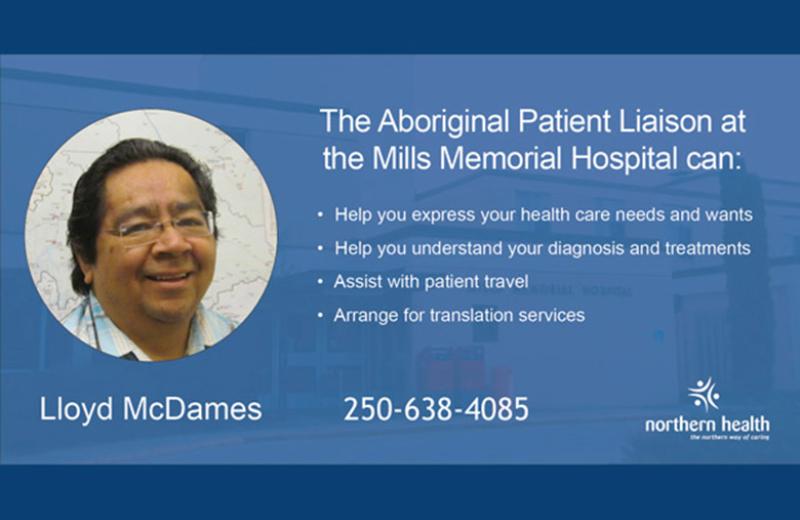Maybe you’ve seen their smiling faces on a TV screen at one of our hospitals or maybe you’ve heard the term “APL,” but you’re still not sure what exactly Aboriginal Patient Liaisons are, much less what they do. Let’s find out!
So, what are Aboriginal Patient Liaisons (APLs) and what do they do?
There are 10 APLs across the North. They work to make sure Indigenous patients, clients, residents, and their families have access to high quality, culturally safe care. They also help close gaps between Western and traditional medicine, ensuring a holistic health approach.
Lloyd McDames is the APL for Mills Memorial Hospital, which serves communities in and around the Terrace and Kitimat areas. In Lloyd’s role, no two days are the same.
“When I reflect on my role as an APL at Mills Memorial Hospital I find my role is that of: a travel coordinator, a comforter, a family researcher, a cultural awareness educator, a support person, an advocate, an outreach worker, a facilitator, a mediator, a problem solver, a community liaison, a social worker, and my favourite: a telephone-tag player,” says Lloyd.
Lloyd and the other APLs across the region work with a diverse group of community members and health care providers. They must learn to adapt quickly to make sure each unique individual receives culturally safe care.
Northern Health created the APL program because we are committed to:
- Partnering with Indigenous peoples.
- Building a health care system that honours diversity and provides services in a culturally relevant manner.
The program runs in partnership with community agencies in Prince George and Smithers (Carrier Sekani Family Services and the Dze L K’ant Friendship Centre Society respectively).
Northern Health’s Indigenous Health team supports the APL program by:
- Providing training opportunities and mentoring.
- Supporting a community of practice.
- Developing communications materials and resources.
- Collaboratively planning, developing and evaluating the program.
What can an APL assist you with?
Indigenous health is holistic and seeks balance. At the heart of this view is an understanding that all things are connected and in relationship to one another – land, water, air, animals, individuals, families, and communities. Holistic health is a process that demands a broad and inclusive perspective for addressing health issues.
Here are some of the ways that APLs can work to make sure your health care experience is holistic:
- Arrange for translation services.
- Help patients understand the health care process, procedures, and terminology.
- Help to ensure admission and discharge planning goes according to patient needs.
- Assist with advanced health care planning.
- Facilitate communication and cultural understanding between patient and care providers.
- Assist patient with end-of-life resources.
- Coordinate spiritual/cultural advisors.
- Support and comfort family and friends.
- Assist with referrals within Northern Health and to community agencies.
- Help link patients to non-insured health benefits.
- Assist with transition to and within long-term care.
How can you get in contact with an APL in your community?
There are 10 APLs throughout Northern Health in the following communities:
- Burns Lake
- Chetwynd
- Dawson Creek
- Hazelton
- North Peace
- Prince George
- Prince Rupert
- Quesnel
- Smithers
- Terrace and Kitimat
Contact information for each area can be found on the Indigenous Health website. Patients are invited to reach out to their APL directly or ask their health care provider for a referral.
Whether you are a health care provider or a patient seeking care, the team of APLs is here for you.














Comments